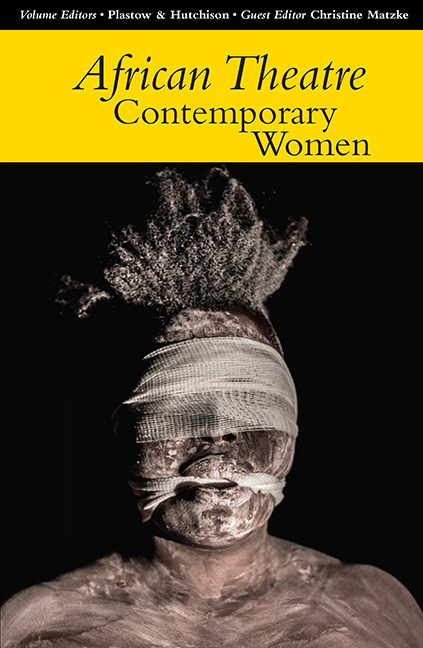Book contents
- Frontmatter
- Contents
- Notes on Contributors
- Editors’ Foreword: Women on the Front Line
- Introduction: Citizen & Artist: African women making theatre
- The Work of Dalia Basiouny: An artist's account
- Performativities as Activism: Addressing gender-based violence & rape culture in South Africa & beyond
- Exploring Poetic Voice in the Uganda Women's Intergenerational Theatre Project
- ‘After Images’: Impressions of the ‘after’ by South African performerchoreographer Mamela Nyamza
- Jalila Baccar of Tunisia: A portrait of an artist
- In Conversation: Interrogating & shifting societal perceptions of women in Botswana through theatre
- Binti Leo: Women in the arts in Tanzania
- Odile Gakire Katese: Making art & reinventing culture with women
- Contemporary Ethiopian Actresses
- Introducing The Sentence
- Playscript
- Book Reviews
Jalila Baccar of Tunisia: A portrait of an artist
Published online by Cambridge University Press: 05 July 2016
- Frontmatter
- Contents
- Notes on Contributors
- Editors’ Foreword: Women on the Front Line
- Introduction: Citizen & Artist: African women making theatre
- The Work of Dalia Basiouny: An artist's account
- Performativities as Activism: Addressing gender-based violence & rape culture in South Africa & beyond
- Exploring Poetic Voice in the Uganda Women's Intergenerational Theatre Project
- ‘After Images’: Impressions of the ‘after’ by South African performerchoreographer Mamela Nyamza
- Jalila Baccar of Tunisia: A portrait of an artist
- In Conversation: Interrogating & shifting societal perceptions of women in Botswana through theatre
- Binti Leo: Women in the arts in Tanzania
- Odile Gakire Katese: Making art & reinventing culture with women
- Contemporary Ethiopian Actresses
- Introducing The Sentence
- Playscript
- Book Reviews
Summary
Jalila Baccar is today generally recognized as one of the leading women playwrights and performers in Tunisia and the Arab world, and the work of her company Familia, co-directed by Baccar and her husband Fadhel Jaïbi, has attained a major international reputation.
Baccar was born in the old city of Tunis in 1952, just four years before that country gained its independence from France. She became increasingly involved in theatre during her school years. Theatre at that time was undergoing major growth in Tunisia, thanks to the support of the new President, Bourguiba, and the efforts of Ali Ben Ayad. Ayad was a Tunisian who had studied in Paris under Jean Vilar and was encouraged by Bourguiba to develop national interest in this art, which included encouraging drama in schools and establishing regional theatre centres throughout the country, following the French model of decentralization.
When Baccar graduated, she left Tunis for the first time in her life to join one of these new regional theatres, at Gafsa, the capital of the southwest of Tunisia, an historical oasis and mining centre. There she met Fadhel Jaïbi, then co-director of the company, whom she later married. They tried for several years to create a more modern and engaged theatre there, but were resisted by both the authorities and the more conservative members of their own company. Finally in 1976 they moved to Tunis, and established Almasrah al-jadid: The New Theatre.
This was the first independent professional company in Tunisia and was deeply influenced by the French and German Independent Theatre movement of the twentieth century. Most of the plays presented were either by politically engaged European dramatists such as Brecht or new Tunisian works that reworked contemporary Tunisian history, filling gaps that the prevailing ideology or official discourse had created.
In 1993 Baccar and Jaïbi formed a new group, Familia, named after its first production, a Tunisian folk comedy about three sisters. Subsequent productions moved in a darker and more symbolic direction, as exemplified by In Search of Aida(1998) which is a symbolist quest play with a distinctly political nature, insofar as it explores the question of Arab identity.
- Type
- Chapter
- Information
- African Theatre 14: Contemporary Women , pp. 54 - 64Publisher: Boydell & BrewerPrint publication year: 2015

